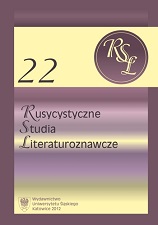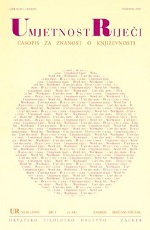
Postmodernistyczna słabość Boga czy słabość człowieka w dramacie Niny Sadur "Jaśniepanienka"
The subject of this paper is the attempt of analysis and characteristic of two heroes — Khoma and God, from their weakness point of view. This drama is Sadur’s dialogic appropriation of Gogol’s tale, but she gave here Khoma quite different role from that one, which prepared the author of Vii. Together with God they are the part of game of religious worth, in which author attempts to show, who is weaker. Khoma fights with evil in the form of Pannochka, at that time God should support him and, at the beginning, He’s indeed doing it. Sadur includes in her drama some proofs of God’s weakness or of that He doesn’t exist. She refers to the scientific researches and philosophers’ theories. Khoma also doesn’t have enough strength to fight with evil. However, although it won, Sadur leaves hope for future.
More...
